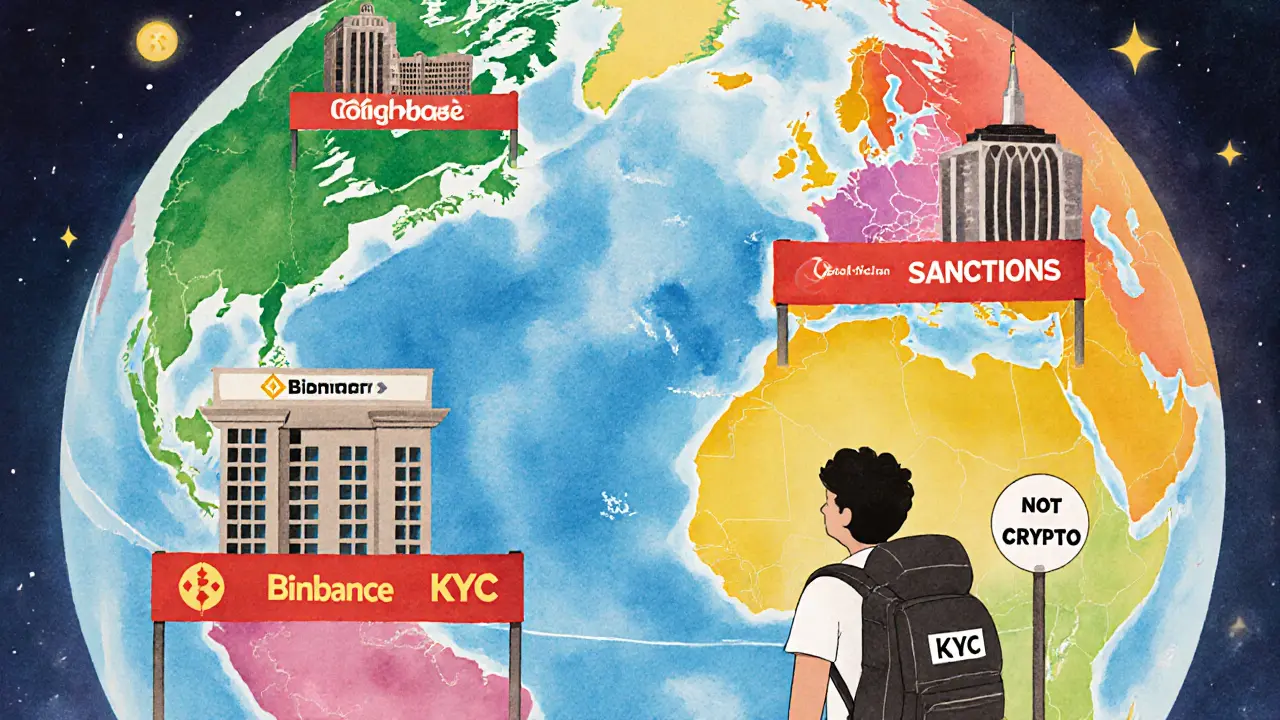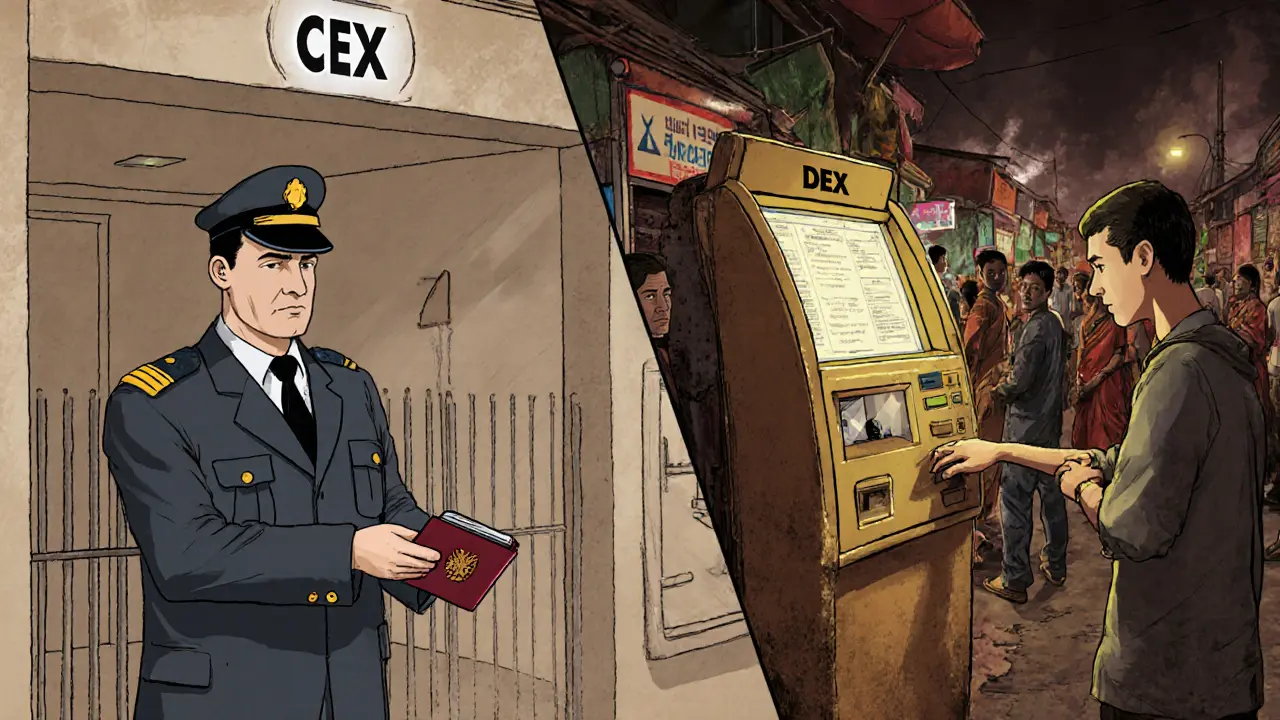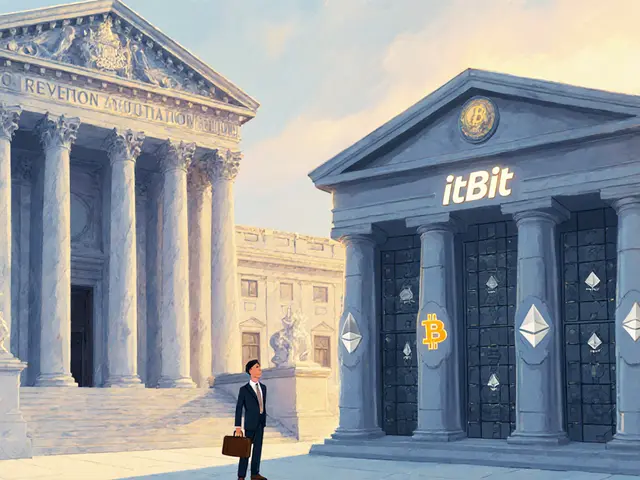
Crypto Exchange Access Checker
Check if you can use centralized (CEX) or decentralized (DEX) exchanges in your country based on current regulations. Select your country to see specific access details and limitations.
If you’ve ever tried to trade crypto and got blocked by a message like "This service isn’t available in your country," you know how messy global crypto access can be. It’s not just about internet speed or language-it’s about where you live and whether you’re using a centralized exchange or a decentralized exchange. The difference isn’t just technical-it’s life-changing for people in countries with strict crypto rules.
Why Your Location Blocks You on CEXs
Centralized exchanges (CEXs) like Binance, Coinbase, and Kraken act like banks with crypto. They need licenses. They need to know who you are. And they follow local laws-strictly. If a country bans crypto derivatives, they turn off that feature. If a government demands KYC for all users, they lock out anyone who won’t submit a passport or utility bill. This isn’t optional. It’s legal risk. In 2024, the U.S. SEC fined Coinbase $50 million for operating without proper state money transmitter licenses. In response, Coinbase stopped offering certain tokens and staking services to users in New York and Texas. In Nigeria, Binance was forced to shut down its local fiat on-ramp after the Central Bank banned banks from processing crypto payments. In Russia, CEXs had to block users who didn’t have a local ID or who tried to use VPNs to bypass restrictions. The result? A patchwork of access. You might be able to trade Bitcoin on Coinbase in Canada, but not in Brazil. You can trade ETH futures on Binance in Singapore, but not in India. Even within the EU, rules vary: Germany allows staking, France doesn’t. And forget about using a U.S.-based CEX if you’re in Iran, Syria, or North Korea-those are outright blacklisted by U.S. sanctions.How DEXs Bypass Geographic Blocks
Decentralized exchanges (DEXs) like Uniswap, PancakeSwap, and SushiSwap don’t have offices. They don’t have CEOs. They don’t ask for your ID. You connect your wallet-MetaMask, Phantom, or Ledger-and trade directly with a smart contract. No middleman. No license. No government approval needed. Because DEXs run on public blockchains, they’re technically global. A user in Venezuela can swap USDC for ETH on Uniswap just as easily as someone in Tokyo. A Nigerian trader can use PancakeSwap to trade BNB without ever touching a bank. Even if your country blocks CEXs, you can still access DEXs if you already have crypto in your wallet. This isn’t magic-it’s architecture. DEXs use Automated Market Makers (AMMs), not order books. Liquidity pools replace human traders. The code runs on Ethereum, BSC, or Solana, and those networks don’t care where you’re logging in from. IP address? Irrelevant. Passport? Not needed. But here’s the catch: you still need to get crypto into your wallet in the first place. If your country bans banks from working with crypto, you can’t buy Bitcoin on a CEX. That means you’re stuck relying on peer-to-peer (P2P) platforms like LocalBitcoins or Paxful, or using crypto ATMs-which are rare and expensive. So while DEXs themselves don’t block you, the on-ramp might.Regulators Are Starting to Target DEXs
For years, DEXs operated in a gray zone. Regulators couldn’t sue a smart contract. But that’s changing. In 2023, the U.S. Treasury’s OFAC added Tornado Cash, a privacy tool used with DEXs, to its sanctions list. Developers behind it were prosecuted. In 2024, the EU’s MiCA regulation explicitly stated that DEX operators could be held liable if they facilitate transactions with sanctioned addresses. Now, some DEXs are starting to build in geo-blocking-quietly. Uniswap Labs (the company behind Uniswap) now requires users to agree to terms that prohibit trading from sanctioned jurisdictions. Some wallets like MetaMask have started showing warnings when users try to connect from Iran or Cuba. Layer 2 networks like Polygon are testing IP-based restrictions on their DEX frontends. This isn’t about technology-it’s about survival. If a DEX wants to keep its developers safe from prosecution, it has to comply. The decentralized ideal is cracking under regulatory pressure. You might still be able to use a DEX from a restricted country today, but that could change next year.
Fiat On-Ramps: The Hidden Geographic Wall
One of the biggest differences between CEXs and DEXs isn’t trading-it’s buying. CEXs let you deposit dollars, euros, or yen directly via bank transfer, credit card, or PayPal. That’s convenient. But it’s also the main reason they’re blocked in so many places. Why? Because banks hate crypto. They fear fines. They fear regulators. So if a CEX wants to offer fiat on-ramps, it needs banking partners-and those partners only work in countries where crypto is legally clear. In Argentina, where inflation is high, you can buy crypto with pesos on Binance. In South Korea, you can use local banks to deposit won. But in Turkey, most CEXs stopped fiat deposits after the central bank banned credit card purchases for crypto in 2021. DEXs don’t offer fiat on-ramps at all. You need to already have crypto. That sounds like a barrier-but it’s also a loophole. If your country bans bank-to-crypto transfers, you can still use a DEX if you bought crypto via P2P, received it as payment, or mined it yourself. For many people in Africa, Latin America, and Southeast Asia, this is the only way to access crypto markets.Security and Responsibility: Who’s Really in Control?
On a CEX, your crypto lives in their wallet. They hold your keys. If they freeze your account, you’re locked out. If they get hacked, you might lose everything-even if you did everything right. But they also offer customer support, insurance, and withdrawal limits to protect you. On a DEX, you hold your own keys. No one can freeze your wallet. No one can stop your trade. But if you send crypto to the wrong address? Gone forever. If you lose your seed phrase? Gone forever. And if your country bans crypto and you’re caught holding it? You’re on your own legally. This isn’t just about tech-it’s about power. CEXs give you convenience and protection, but they take away control. DEXs give you freedom, but they make you responsible for everything. In countries with unstable governments or shaky banking systems, that trade-off matters. A Venezuelan user might prefer a DEX not because it’s safer, but because it’s the only thing that can’t be shut down by a decree.
What This Means for You
If you live in the U.S., Canada, Western Europe, or Australia: CEXs are easier. You get fiat deposits, customer support, and regulated products. DEXs are for advanced users who want privacy or access to tokens CEXs won’t list. If you live in Nigeria, Argentina, Vietnam, or Ukraine: DEXs might be your only option. But you’ll need to figure out how to get crypto into your wallet first. Use P2P platforms. Use crypto ATMs. Talk to local crypto communities. They know the workarounds. If you’re in Iran, Russia, or North Korea: Even DEXs are risky now. Some wallets and frontends are starting to block you. Your best bet? Use privacy tools like Tornado Cash (if still functional), hardware wallets, and air-gapped devices. But know the legal risks.Future Outlook: Will DEXs Become Just as Restricted?
The dream of a truly borderless crypto market is fading. Regulators are no longer ignoring DEXs. They’re learning how to target them. The next five years will see more DEXs adding geo-blocks, more wallet providers enforcing sanctions, and more governments requiring compliance from open-source developers. That doesn’t mean DEXs will disappear. It means they’ll become more like apps with terms of service-still decentralized at the protocol level, but increasingly controlled at the user interface level. Your best move? Use both. Keep some funds on a CEX for easy fiat access and trading. Keep the rest on a DEX for privacy and censorship resistance. And always, always back up your seed phrase. No one else can help you if you lose it.Can I use a DEX if my country bans crypto?
Technically, yes-DEXs don’t require KYC or location verification. But if your country bans crypto entirely, using a DEX could still be illegal. You’d need to already have crypto in your wallet (bought via P2P or mining), and you’d face risks like asset seizure or fines if caught. Enforcement varies by country, but the legal risk exists.
Why can’t I use Binance in the U.S.?
Binance Global was blocked in the U.S. because it didn’t comply with U.S. financial regulations. The SEC and CFTC said it operated without proper licenses, especially for derivatives and staking. Binance.US was created as a separate entity to comply, but it offers fewer coins and features than the global version. You can’t access Binance Global from the U.S. without a VPN, and doing so violates their terms.
Are DEXs really safer than CEXs?
It depends. DEXs don’t get hacked like centralized platforms because your funds never leave your wallet. But you’re responsible for everything: losing your seed phrase, sending crypto to the wrong address, or interacting with a scam contract. CEXs have insurance and support, but they can freeze your account or go bankrupt. Neither is perfectly safe-it’s about what kind of risk you’re willing to carry.
Can I use a VPN to access a blocked CEX?
You can, but it’s against most CEX terms of service. If they detect you’re using a VPN, they may freeze your account or require additional verification. Some users do it to access better rates or trading pairs, but if you’re caught, you lose access. It’s a gamble-not worth it unless you understand the legal consequences in your country.
Which DEXs work best in restricted countries?
Uniswap (Ethereum), PancakeSwap (BSC), and SushiSwap are the most widely used and resilient. They’re open-source, have no central company to shut down, and run on public blockchains. Avoid DEXs tied to specific companies with legal exposure (like some newer ones on Solana or Arbitrum). Stick to the oldest, most audited protocols with large liquidity pools.
Do I need to pay taxes if I trade on a DEX?
Yes-in most countries, crypto trades are taxable events, even on DEXs. Whether you use a CEX or DEX, selling ETH for USDC, swapping tokens, or earning yield counts as a capital gain or income. Tax authorities can track blockchain transactions. DEXs don’t report to the IRS or other agencies, but you’re still legally required to report your trades. Use crypto tax tools like Koinly or CoinTracker to track your activity.
28 Comments
Write a comment
More Articles

itBit Crypto Exchange Review 2025: Fees, Regulation & Institutional Features
A 2025 review of itBit crypto exchange covering fees, regulation, liquidity, OTC desk, pros/cons, and how it compares to other US exchanges.

TVL Explained: The Top DeFi Investment Metric in 2025
Learn what TVL is, why it matters for DeFi investing, its limits, and how to use it wisely in 2025.

EU Sanctions and Cryptocurrency Compliance: What You Need to Know in 2025
As of 2025, EU cryptocurrency compliance is enforced through MiCA, TFR, and CARF. All crypto service providers must license up, track every transaction over €1,000, and report to tax authorities. Non-compliance means fines, blacklisting, or criminal liability.
Emily Unter King
November 10, 2025 AT 12:42CEXs are essentially financial gatekeepers with regulatory compliance baked into their architecture. The moment you introduce fiat on-ramps, you're subject to AML/KYC regimes, banking partnerships, and jurisdictional fragmentation. DEXs bypass this by design-no intermediaries, no licensing, no liability. But the real tension isn't technical-it's philosophical. Are we building financial infrastructure for accessibility or for compliance? The answer determines whether crypto remains a revolution or becomes just another regulated asset class.
And yes, OFAC targeting Tornado Cash was a watershed moment. It signaled that regulators now see smart contracts as vectors, not abstractions. The decentralized ideal is being redefined by legal precedent, not code.
Also, let’s not pretend MetaMask’s geo-warnings are ‘voluntary.’ They’re contractual obligations disguised as UX.
Bottom line: DEXs are the last bastion of financial sovereignty. But sovereignty without on-ramps is just isolation.